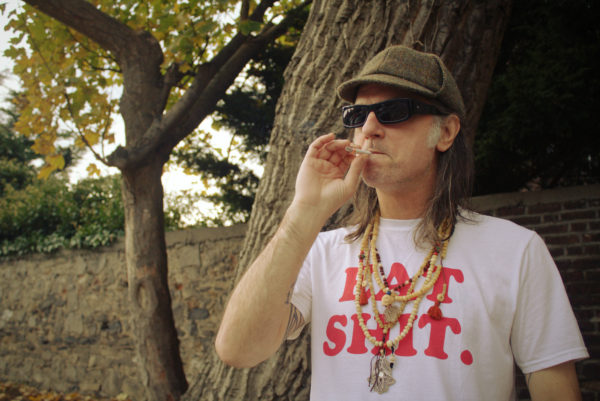
Regarding Anton Newcombe, the controversial frontman of The Brian Jonestown Massacre, as he sits across from me in the lobby of the Clayton Hotel, casually sipping on a cup of peppermint tea, I am struck by how far removed he truly is from his customary portrayal in the media. How am I supposed to reconcile this quietly spoken man, who made great efforts to hold the door open for every passerby, with the intimidating and erratic image that is consistently assigned to him?
Newcombe believes that this erroneous representation is the product of his outspoken antipathy towards the music industry: “You can’t really have it both ways. You can’t tell everybody to fuck off and expect to be accepted. I kind of pointed out superficially that there’s a seductive game that these people play with people’s egos, and when you reject that, they don’t want people to know that you can create a world on your own terms.”
Newcombe is well known for his artistic autonomy, which developed from his aversion to commercialism. “When you’re in a recording studio you have to develop some kind of language and do something that other people aren’t doing or haven’t done”, he says. “There’s no point of reference [for music industry professionals] to help you in that situation. The problem with recording studios is people immediately go, ‘oh, this is what it should be like’.”
My philosophy is that I’m interested in playing music, so I’m not interested in having validation from a business person
Lamentations on capitalist society are a recurring theme in our conversation. Business, he asserts, has “wrecked everything everywhere”. He believes that commercial motivations are not conducive to the creation of true art. “To me, it seems like music is secondary to a lot of other things that people want”, he tells me. “It’s like a tool that they’re using to get whatever they want, whether that’s fucking supermodels, getting invited to cocaine parties, never paying rent again. It’s just endless, right. You know that that’s the fact because most groups, my peers, all those wonderful people, everybody talks about being so incredible, but they’re not really making any music.”
The same certainly cannot be said for Newcombe. He has already released two albums this year with both The Brian Jonestown Massacre and Tess Parks (a Toronto-born singer-songwriter), and another one is due to be made public in the near future. He also plans to produce an album for the Estonian band The Holy Motors. “My philosophy, you know, is that I’m interested in playing music, so I’m not interested in having validation from a business person.”
Do you think human beings are destined to watch footy matches and play video games and fuck off to the pub all day long?
He tells me about his latest album, Something Else, which acts as a response to our increasingly corporate world. “On a conceptual marketing level, you go into a record shop, and all these covers are just fantastic. It doesn’t matter about the music, you know. And you’re just confronted by images everywhere, right. So I just made a white cover in response to all that overload, in response to everybody’s Instagram and set-up lifestyle shots and marketing. There’s all of that in the whole shop, but this is Something Else.”
Music, for Newcombe, is something that has the power to alleviate the problems he faces. “It’s hard to deal with people, you know, and reality. That’s why it’s good to be an artist and create your own reality.” The facts of existence are something he finds sociologically concerning. “Do you think human beings are destined to watch footy matches and play video games and fuck off to the pub all day long? Is that what we’re really meant to do? But look at the overwhelming reality. It’s really piss poor, right?”
Candidly, he informs me that he is looking forward to the end of the tour because there have been some creative differences between him and other band members. “I’ve a higher level of standards I’m looking for, you know. Certain people don’t understand the music. You make up music, and there’s nothing you can do about it. I try and go over it every single day with certain people. It’s just them not understanding what’s required with the music. I mean, how do you describe ‘you’re not really playing sexy enough’?”
Despite this, his passion for playing with others has not been diminished. “When I play live that’s where it lives or dies. And it’s very ephemeral, it’s everybody together, it’s not some guy standing up on the stage making it happen if it’s a real type of music.” I smile at this statement, considering how unthinkable it would be for anybody who has listened to The Brian Jonestown Massacre to question the authenticity of those raw, mesmerising songs that have cultivated the adulation of generations of music fans.






